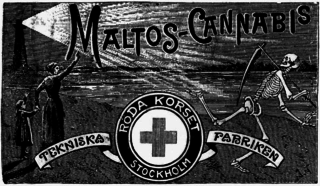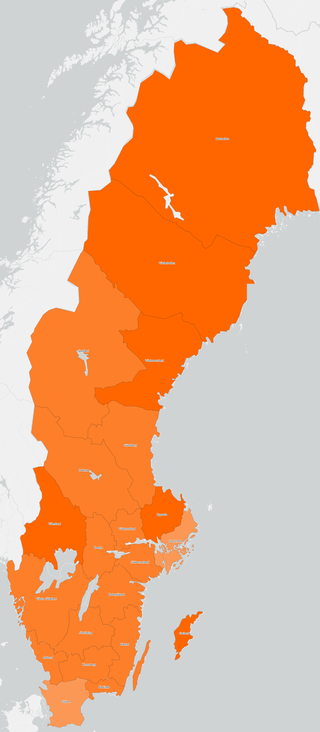
Pharmacia was a pharmaceutical and biotechnological company in Sweden that merged with the American pharmaceutical company Upjohn in 1995.

Penciclovir is a guanosine analogue antiviral drug used for the treatment of various herpesvirus infections. It is a nucleoside analogue which exhibits low toxicity and good selectivity. Because penciclovir is absorbed poorly when given orally it is more often used as a topical treatment. It is the active ingredient in the cold sore medications Denavir, Vectavir and Fenivir. Famciclovir is a prodrug of penciclovir with improved oral bioavailability.

AL-LAD, also known as 6-allyl-6-nor-LSD, is a psychedelic drug and an analog of lysergic acid diethylamide (LSD). It is described by Alexander Shulgin in the book TiHKAL. It is synthesized starting from nor-LSD as a precursor, using allyl bromide as a reactant.
Astra AB was a former international pharmaceutical company headquartered in Södertälje, Sweden. Astra was formed in 1913 and merged with the British Zeneca Group in 1999 to form AstraZeneca. Product development was focused on therapeutics for gastrointestinal, cardiovascular and respiratory disorders and pain control. At the time of the fusion, Astra was the largest Swedish pharmaceutical company. Astra also operated Astra Tech, a medical devices company, and marketed pharmaceuticals outside their primary development area, including anti-infective agents.

In the field of pharmacy, compounding is preparation of a custom formulation of a medication to fit a unique need of a patient that cannot be met with commercially available products. This may be done for medical reasons, such as administration in a different format, to avoid a non-active ingredient the patient is allergic to, or to provide an exact dose that isn't commercially available. Medically necessary compounding is referred to as "traditional" compounding. It may also be done for medically optional reasons, such as preference of flavor or texture, or dietary restrictions.

Trollhättan–Vänersborg Airport is a small regional airport situated outside Trollhättan, Sweden. Braathens Regional Airlines (BRA) has its corporate head office on the airport property.

The Bellevue Mosque is a mosque in Gothenburg, Sweden. It is located at Generalsgatan 2A in the "Bellevue" district of Gothenburg. The mosque is administered by the Somali-dominated Islamic Sunni Centre Denomination and advocates the Salafi movement of Islam. It was created with funds from Saudi Arabia.

The Medical Products Agency is the government agency in Sweden responsible for regulation and surveillance of the development, manufacturing and sale of medicinal drugs, medical devices and cosmetics.
Socialdemocrats for Faith and Solidarity, formerly the Swedish Association of Christian Social Democrats organizes religious members of the Swedish Social Democratic Party. The organization was founded in 1929 as an organization for Christian social democrats. Since 2011, it has been open for members of all religions. It is an associate member of the International League of Religious Socialists.
Fuat Deniz was a Swedish sociologist and writer of Assyrian descent. Until his murder in 2007, he worked as a lecturer in sociology at the Department of Social and Political Sciences at Örebro University.
A formulary is a list of pharmaceutical drugs, often decided upon by a group of people, for various reasons such as insurance coverage or use at a medical facility. Traditionally, a formulary contained a collection of formulas for the compounding and testing of medication. Today, the main function of a prescription formulary is to specify particular medications that are approved to be prescribed at a particular hospital, in a particular health system, or under a particular health insurance policy. The development of prescription formularies is based on evaluations of efficacy, safety, and cost-effectiveness of drugs.

Tommy Möller is a Swedish professor of Political science at Stockholm University, and a frequent conservative political commentator in the Swedish media.

25I-NBF is a derivative of the phenethylamine hallucinogen 2C-I, which acts as a highly potent partial agonist for the human 5-HT2A receptor, with bias towards the β-arrestin 2 coupled signalling pathway. It has been studied in its 11C radiolabelled form as a potential ligand for mapping the distribution of 5-HT2A receptors in the brain, using positron emission tomography (PET).
Eva Maria Meyersson Milgrom is a Swedish-born American social scientist publishing both in economic and sociology academic journals. She received her Ph.D. from the Department of Sociology at Stockholm University in 1992.

Cannabis in Sweden is illegal for all purposes. It is illegal for recreational purposes, for most medical purposes and possession of even small amounts of cannabis is a criminal offence. Consequently, limited medical usage of cannabis-based drugs is only allowed for specific conditions.
Vulnerable area is a term applied by the Swedish Police Authority to areas with high crime rates and social exclusion. In the December 2015 report, these areas numbered 53. In the June 2017 report, these totalled 61. The increase is reported to be due to better reporting, not a changing situation. The overall trend is that these areas are improving.

Kronans Droghandel Apotek AB, doing business as Kronans Apotek, is a Swedish pharmacy company. The pharmacy chain is owned by the Finnish company Oriola Oyj-KD, which is listed on the Helsinki Stock Exchange. Kronans Apotek has 326 pharmacies across Sweden, and over 65,000 customer visits per day.

Vaccination against COVID-19 in Sweden started on 27 December 2020 after the approval of the Pfizer–BioNTech vaccine by the European Commission. In Sweden, the Public Health Agency has been commissioned by the government to create a vaccination plan. Sveriges riksbank, the central bank of Sweden, predicts that efficient vaccination against COVID-19 has macroeconomic benefits. As of 20 April 2022, 87.1% of people in Sweden have received at least one dose, with a total of 21,491,717 doses administered. At least one vaccine has been approved for all age groups 12 and older. Children younger than 12 in high risk groups can also be vaccinated.
Yrjö Wilhelm Jalander was a Finnish pharmacist and the founder of Oy Merijal Ab and the pharmaceutical factory Leon.













